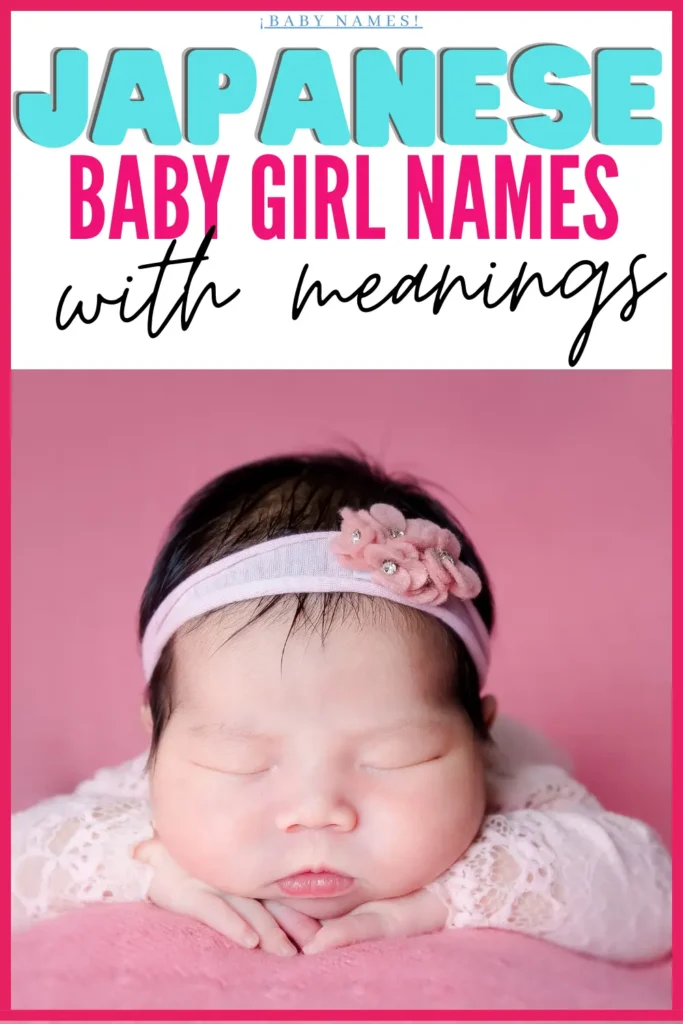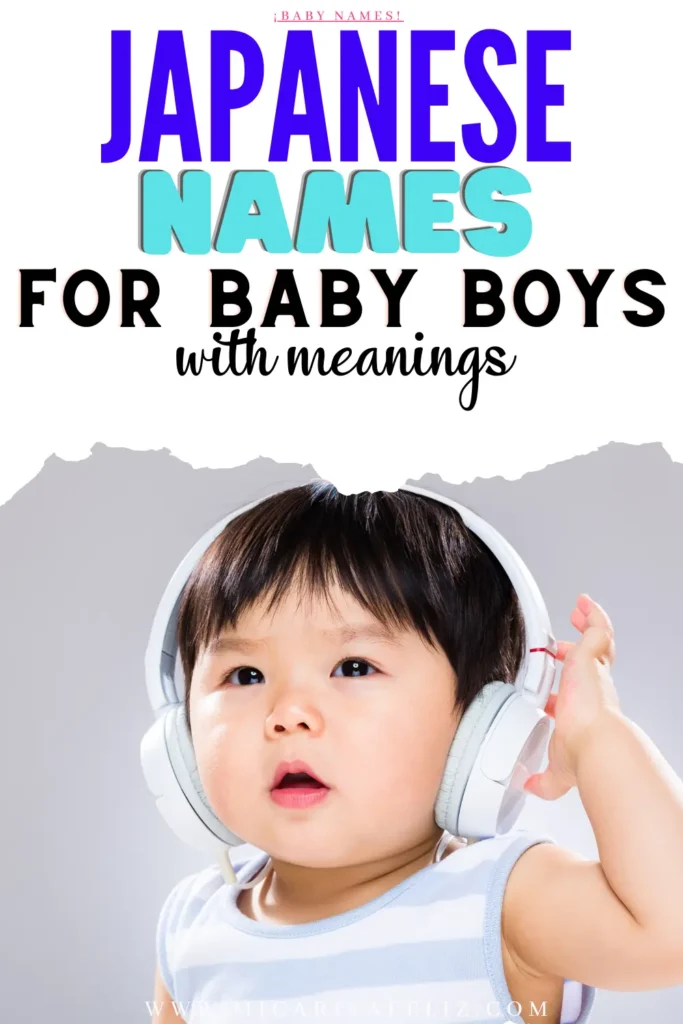We love Japan, its culture, and everything about that incredible land including the cutest Japanese baby names.
Japan, the country which is known as “The Land of the Rising Sun” certainly has a fascinating and multifaceted culture.
On one hand, it’s steeped in deep traditions that go back thousands of years, and on the other hand, it is a society with a state of continuous, rapid change and technological development.
All this has consequently led Japan to become one of the global powerhouses.
Japan is such a fascinating country to visit. And on second thought, why not give your baby a Japanese name?
Some of the most important and popular cities in Japan such as Tokyo, Nara, Osaka, and Kyoto are now fashionable girl names used in different countries.
If you are looking for different, original, and popular names of Japanese origin, you will surely find them here!
Most popular Japanese names for girls.

Before choosing a Japanese name, we will discuss the basics of these names and how culturally parents choose the name for their child.
Well, choosing a Japanese name is something very difficult and tedious for parents, since behind every name there is a whole tradition and some strong beliefs.
Japanese believes that the child’s name will influence their life and luck.
Did you know that the Japanese usually write a list of what they wish this name to represent, and then they take the different phonetic sounds to find the Kanji that is phonetically equivalent, and thus they usually find or choose a name?
With this in mind, let’s discover this list of some of my favorite Japanese positive names.
And if what you like are elegant and charming names with a melodious intonation, French and American names could be a good option for you.
Let’s start 🙂
- Asaka: Asaka means “morning aroma” and is of Japanese origin.
- Aiko: The name Aiko means “beloved child” and is of Japanese origin.
- Azura: “Blue”
- Akiko: “The Child of Autumn”
- Aki: “autumn, shine, bright”
- Akie: The meaning of the name “Akie” is: “Autumn painting.”
- Aya: “Woven silk, color” – (Japanese). This name is also used in Ghana and Ivory Coast to designate girls born on Thursday.
- Ayami: Ayami in Japanese means “Iris”
- Ayumi: feminine Japanese name that means “Walk”
- Ayako: Ayako can be written using different kanji characters and can mean: “writing, child”, “coloring, child”
- Azami: means «Thistle flower»
- Azumi: of Japanese origin with the meaning of “safe residence.” Azumi is generally used as a girl’s name.
- Emi: “Well done, Beauty”
- Gen: means “source”
- Gin: means “Money”
- Hama: “Seashore”
- Hamako: “The boy from the edge of the beach”
- Hanaé: “Flower”
- Hanako: The name can have different meanings, one of them is 花子, which means “flower girl”.
- Haya: “fast”
- Hisaé: “Who lives long”
- Hiroka: is a common feminine given name in Japan. Hiroka can be written using different kanji characters and can mean: 博 華, “wise flower” 寛 香, “tolerant aroma” 宏 香, “great aroma”.
- Hideki: The name Hideki means Extreme, Excellence, and Tree and is of Japanese origin.
- Hiromi: is a Japanese name that can be given to men or women. It means “Generous Beauty (寛 美)” although it can have other meanings depending on the kanji used.
- Hiroko: The name Hiroko means “Generous Child” and is of Japanese origin.
- Imaé: Current generation
- Imako: “The child of the present”
- Iné: “Rice”
- Iwa: “solid as a rock”
- Karou: is a Japanese girl name meaning “hope”
- Kaori: means “smell/aroma, cloth/fabric” and is occasionally translated as “perfume.” [kaoɾi]) is a feminine name.
Kazumi
This Japanese name is unisex, which means that it is equally suitable both for men and women. The name is often written using the Japanese characters for ‘Kazu’, which has the meaning of harmony and peace, along with ‘mi’, which means beautiful or beauty.
- Kaiko: means “The child of forgiveness”
- Kameko: means “The turtle boy”
- Kana: “Powerful”
- Kayoko: means “son of a flourishing generation”
- Kazuto: Kazuto is used predominantly in Japanese and is also derived from Japanese origins. The meaning of Kazuto is a “harmonious person.”
- Kimiko: Kimiko means “The fair child “
- Kiyo: Kiyo is a feminine Japanese name that means “Happy generation “
- Kishi: means “Happy and long-lived”
- Kohana: means “Sweet, little flower”
- Koko: means “Stork”
- Koto: means “Harp”
- Koki: The meaning of the name “Koki” is: “Vast and strong”.
- Kumi: means “Ten, long”
- Maki: is a very common Japanese feminine name. Maki can be written using different kanji characters and can mean “true, precious”
- Maeko: means “The honest boy”
- Maemi: means “Smile of truth”
- Mayuri: from Japanese 真 (ma) which means “real, genuine”, 結 (yu) which means “to bind, hold, unite, organize” combined with 里 (ri) which means “village”.
- Mio: meaning “Beautiful, cherry blossom”
- Mai: “Shine, festival”
- Midoli: “Green color”
- Miyoko: Female Japanese name that means “A beautiful boy” Miyoko is a name primarily used for baby girls
- Mieko: “Very beautiful child”
- Miki: means “tree, beautiful”
- Misao: meaning “Faithful, loyal”
- Mitsuko: “Child of light”
- Miho: “Ear of rice, truth, beauty, future step, sail”
- Miyo: “beautiful”
- Motoko: The name Motoko is a girl’s name that means “ingenious child.” Motoko Kusanagi, perhaps the best-known association with this name, is a character from the science fiction manga and anime series The Ghost in the Shell.
- Mori: “Forest, forest”
- Nami: “wave”
- Nanako: From the Japanese (na) which means “vegetables” doubled and (ko) which means “child”.
- Nara: “Oak, a symbol of stability”
- Nioko: “Treasure”
- Noriko: The name Noriko means “Law, Rule, Code, Ceremony” and is of Japanese origin.
- Rina: means «Jasmine»
- Saori: The name Saori means “flowing red silk” or “floating white lily.”
- Sachi: means”Girl of joy”
- Sakura: “Cherry”
- Sayaka: from the Japanese (sa) meaning “sand” or (sa) meaning “thread, silk” with (ya) meaning “also” or (ya), an interjection, combined with (ka) meaning “fragrance” or 加 (ka) which means “to increase”.
- Seiko: “Who successfully guides”
- Shizuka: The name Shizuka means “Quiet, Summer, Smell, Perfume” and is of Japanese origin.
- Shinnosuke: Japanese name: 慎 之 介 which means humility, be careful, discreet, prudent. / 之 meaning of this. / 介 which means stuck, shellfish, mediate, worry about yourself.
- Shina: “Virtuous”
- Sukey: means “Princess of the sun”
- Sumi: means “Necessarily”
- Takara: means “Treasure”
- Tama: means “Jewel”
- Tamako: means “The Jewel Boy”
- Tami: “People”
- Tamika: “People”
- Tamiko: “the child of the people”
- Tanaka: “Reward”
- Tori: “Ave”
- Uta: “Poem”
- Umiko: means “Girl of the sea”
- Yachi: “eight thousand”
- Yoko: The name Yoko is almost always written with the kanji 子 (ko), which means “child.” … 陽 子, «sun, child», «sunny, child».
- Yoshi: meaning “Good”
- Yoshimi: From the Japanese kanji 好 (yoshi) which means “affection” or 良 (yoshi) which means “good” combined with 美 (mi) which means “beauty; beautiful”.
- Yoshiko: means “Good girl”
- Yoshino: “Beautiful dance”
- Yuki: “Snow, luck”
- Yuko: means “funny boy”
- Yuri: means “lily”
- Yumi: means “Bella bow”
- Yurika: means “Beautiful lily”
Japanese names for boys and their meanings

- Ado: “Without more ceremony”
- Akemi: “Nascent beauty”
- Aki: “Shine, darling”
- Akira: “It is a unisex Japanese first name that is used predominantly for men. It means “graceful strength.”
- Akihito: “Brilliant person”
- Akira: “Very smart”
- Asako: the meaning of the name “Asako” is “Child of the morning”
- Daisuke: “The name Daisuke means Big, Big and is of Japanese origin.”
- Dai: “Big”
- Daichi: The name Daichi means «Earth, earth; wisdom, intellect «and is of Japanese origin
- Fukuda: of Japanese origin and means: ‘blessed rice field’; written in various ways. Toponym and surname are common throughout Japan and the Ryukyu Islands.
- Goku: “awareness of emptiness”
- Gou: ” strong as a mountain”
- Haruto: “Tender sound”
- Haruko: “Spring child, sunshine, firstborn child”. Is a unisex Japanese name.
- Heshuku: “there is no specific meaning of this female.
- Hideki: The name Hideki can be written using different Kanji characters. This means the name can have a variety of meanings such as “Extreme, Excellence, Tree, superior, timber trees” and is of Japanese origin.
- Hisato: “One with long life”.
- Hitoshi: “Benevolence”
- Hiroshi: “Brave”
- Hiroyuki: The name Hiroyuki means: “Peace, Harmony” and is of Japanese origin.
- Hoshi: Is the Japanese word for “Star”
- Junichiro: “The one who takes” or “He who takes” Is of Japanese origin.
- Kamijo: Kamijo means “Above God”.
- Katsumi: This Japanese name can be written using different kanji characters and can mean: “Win, overcome oneself and beauty”
- Katsuro: means “Victory of the son”
- Kahei: means “Navigation “.
- Kazuki: means “Peaceful Tree, brilliance, hope, harmony “and is of Japanese origin.
- Kazu: Kazu has different Kanji character combinations meaning “Spring, harmony, peace”
- Kazumi: The Japanese name Kazumi means “Harmony, beautiful, peace”
- Kenta: Kenta is a name that has been used primarily by Japanese parents who are considering baby names for boys. Means “healthy, strong, thick, big”.
- Kenzou: “Strong, wise, and healthy” from Japanese.
- Kei: Masculine Japanese personal name; increasingly used as a feminine personal name, as an abbreviation for Keiko.
- Kioshi: o Kohichi is a Japanese male name. The meaning of the name “Koishi” is: “Happiness and one”.
- Koichiro: Masculine Japanese giving name that means “son, prospered, one”
- Kohei: is a name that has been used primarily by parents who are considering baby names for boys. Origin Japanese and means “navigation”.
- Kunihiro: Japanese male name «邦» means the country. “浩” means wide. Other kanji combinations are possible.
- Kunikazu: meaning is “Mythology, history”
- Masashi: Masashi means “Commander, General” and is of Japanese origin.
- Masatoshi: means “Refinement, grace, elegance”
- Masami: The name Masami means “to become beautiful” and is of Japanese origin.
- Makoto: is a unisex Japanese name commonly more used by males. Makoto means “A sincere person, true”.
- Matsu: Japanese male name that means “pine”.
- Miki: means “beautiful, tree”
- Nao: Nao is a Japanese masculine name the meaning depends on the kanji used. Means “Love, affection, honey”.
- Naoto: The meaning of Naoto in Japanese is: “Truthful person, honest.” But please note that many names may have different meanings in other countries and languages.
- Nakai: This Japanese masculine name has its origin in the island of Okinawa it means “be beautiful.”
- Naoki: The name Naoki means “Truthful honest and open tree” and is of Japanese origin.
- Natsuo: This name means «he who came into the world during the summer»
- Noboru: The name Noboru means “Climb, Ascend” and is of Japanese origin.
Nobuyasu
Nobuyasu is a Japanese masculine given name. This name can be created with 延 / 伸 (Nobu) which means “Stretch, prolong, extend”, or 信 (Nobu) which means “Trust, Faith, Believe”, and 康(Yasu) which means “Peaceful”, 泰 (Yasu) which means “Thailand, peaceful”, or 安 (Yasu) which means “Relax, rested, cheap, low”. This is just a kanji summary, others may also be used.
- Noritaka: Noritaka has the meaning “of filial law and piety.” pronounced as NowRIY-Taa-Kaa-.
- Ryota: The name Ryota means “splendid, clear, Refreshing, Good, Thick, Large “and is of Japanese origin.
- Ryo: is of Japanese origin. Ryo is a name that has been used by parents considering unisex baby names.
- Ritsuki: from the Japanese 里 (ri) which means “town” combined with 月 (tsuki) which means “moon”.
- Saku: means “Memory of the divine”
- Samuru: meaning “His name is God”
- Sanyu: is a name for boys and the meaning of this name is “Happiness, joy”.
- Satoshi: the name Satoshi means “Intelligent History” and is of Japanese origin.
- Takahiro: The name Takahiro means Filial, Noble and Valuable Piety. It is of Japanese origin.
Tatsuya
Tatsuya can be written using different kanji characters and can mean: 達 也, “master / consummate, be” 達 矢, “master / consummate, arrow” 竜 也, “dragon, be” … 辰 也, “sign of the dragon, be be”.
- Tsuyoshi: can be written using different kanji characters and can mean: 剛 “robust” 豪, “overwhelming” 毅, “strong” 力, “power”.
- Takuji: of unknown meaning. Famous: Takuji Yonemoto Footballer.
- Takeshi: is a male Japanese given name that means “different”.
- Takuya: «The name Takuya means “To Increasingly Cultivate” and is of Japanese origin. Takuya is a name that has been used primarily by parents who are considering baby names for boys.
- Tetsou: The meaning of Tetsou is “wise man” Tetsuo is generally used as a boy’s name. It consists of 6 letters and 2 syllables and is pronounced Tet-suo.
- Tomiko: The name Tomiko means “Wealth, abundance”.
- Tomoya: Japanese name meaning “friend of.” Tomoya is a name that has been used primarily by parents who are considering baby names for boys.
- Tomoko: From the Japanese 寛 (tome) which means “tolerant” combined with 暁 (aki) which means “dawn”.
- Toshi: is a male Japanese given name. It is also a nickname or abbreviation for several longer names and means “Brilliant”.
- Tomohiro: The meaning of the name “Tomohiro” is: “Wide wisdom.” It is a Unisex Japanese Name
Yamato
Yamato is an ancient name from Japan. It can also refer to the Yamato period in Japanese history, which lasted until the 8th century. The individual kanji are 大 which means “great” and 和 which means “harmony”.
- Yoshiki: The meaning of this name is “Honor, Glory ” and is of Japanese origin.
- Yosuke: The meaning of the name “Yosuke” is: “Give help.” Name used in Japanese-speaking countries.
- Yuu: The meaning of the name «Yuu» is: “gentleness, superiority”. Is a unisex name used in Japanese-speaking countries?
- Yuki: The name Yuki means “snow, happiness or luck” and is of Japanese origin.
- Yunheng: Means “Realism, serenity, discipline, sincerity”
- Yukiko: “Precious, child”.
Yuichiro
From the Japanese kanji 優 (yū) which means “sweetness, agile, superior” or 雄 (yū) which means “masculine” or 祐 (yū) which means “divine help” combined with 一 (ichi) which means “one” and 郎 (rō) which means “son”.



